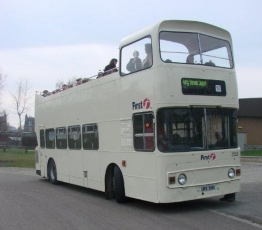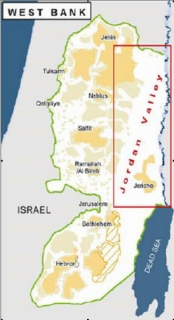On March 1st the Aberdeen branch of Scottish Palestine Solidarity Campaign will be hosting three exciting speakers at Aberdeen University: Fathe Kdirat and Itaf Njoum Karma from Jordan Valley Solidarity, and Leehee Rothschild from Boycott from Within (Israel).
Fathe and Itaf, both Palestinians, will be discussing Israel’s destruction of communities and the environment in the Jordan Valley, and the on-going illegal Israeli settlement construction that continues to drive Palestinians from their land.
The Jordan Valley makes up a large section of the West Bank, around 28% in total. It has been one of the worst affected areas of the West Bank during the Israeli occupation, which began in 1967.
The occupation saw the Jordan Valley’s population drop by 88% and was thereafter the site of Israel’s first settlements.
Since the occupation Israel has gone about taking almost complete control of the area. This map (click to follow link) published in December 2011 by the United Nations Office for Co-ordination of Humanitarian Affairs (OCHA) shows that 15% of the Jordan Valley comprises settlements (blatantly illegal under international law[i]), 27% comprises nature reserves, often used to control natural resources such as water supply (to the detriment of Palestinians) and 56% comprises closed military areas.
In addition, 87% of the Jordan Valley is designated Area C, i.e. under Israeli control. The 1993 Oslo Accords divided the occupied West Bank into 3 sections: Area A, under the full control of the Palestinian Authority (3% of the West Bank); Area B, under Palestinian civilian control and Israeli military control (25%); and Area C, under the full control of Israel (72%). Designating land as Area C gives Israel unlimited autonomy to do as it pleases and to ignore the rights of Palestinians. For example, according to UN OCHA 94% of Area C planning applications submitted by Palestinians were denied between 2001 and 2007.
One of the main focuses of Israel policy in the area is to clear the Jordan Valley of its Bedouin population. In September 2011 the Israeli government announced its plans to expel 27,000 Bedouin from their homes and lands in the Jordan Valley. This process is due to be completed in the next 3-6 years; the initial stages have already begun.
The role of activism, resistance and international solidarity is crucial in the fight to prevent this attempted ethnic cleansing of the Jordan Valley. Fathe and Itaf will talk on how Palestinian communities and internationals are working together to witness, catalogue and resist Israel’s actions, and the importance of the Boycott, Divestment and Sanctions (BDS) campaign against apartheid Israel.
One crucial component of the BDS campaign is the small but important resistance movement within Israel itself. This includes the campaign group Boycott from Within.
“We, Palestinians, Jews, citizens of Israel, join the Palestinian call for a BDS campaign against Israel, inspired by the struggle of South Africans against apartheid. We also call on others to do the same.” Boycott from Within Website
Organisations like Boycott from Within are operating within a state becoming increasingly reactionary to the growing success of the calls for the end of the occupation, equal rights for Palestinians within Israel, and the right of return for Palestinian (the three main tenets of the BDS campaign). In July 2011 the Knesset (Israeli parliament) passed an anti-boycott bill, criminalising those who support boycotts of Israel or its illegal occupation and settlements.
The bill has implications for individuals and organisations alike; for example companies deciding not to source products from illegal settlements in the West Bank may be barred from government contracts. More recent Knesset bills have turned their attention to NGOs working in Israel, such as groups aiming to promote human rights.
One such law proposes to place a limit on the funding NGOs can receive from foreign governments and institutions, meaning many will be unable to function.
Leehee Rothschild will be speaking about her involvement in internal resistance movements such as Boycott from Within and Anarchists Against the Wall, as well as exploring issues of propaganda within the Israeli education system.
The talk starts at 7pm on March 1st in room 268 in the MacRobert Building at Aberdeen University. For more information contact: Aberdeen@scottishpsc.org.uk
[i] for example see the International Court of Justice ruling 2004, the Fourth Geneva Convention, and UN Security Council Resolution 446


